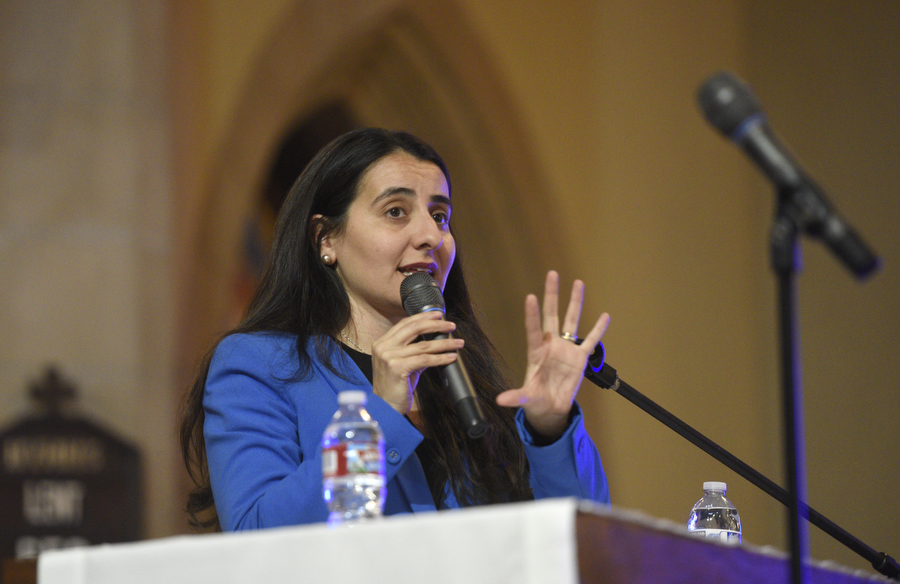A Scary Time for Santa Barbara Tenants as Eviction Protections Vanish
State Senate Considers Extending Rental Assistance Timeframe to Forestall Evictions

A bill in the California Legislature looks likely to pass on Thursday that would extend the rent relief offered since September 2020. It’s intended to give tenants who have suffered financially due to COVID until June 30 to pay their landlords in the hope of avoiding eviction, but they must apply by March 31.
Currently, the state’s rental assistance program ends at the end of March, but Assembly Bill 2179 passed the Assembly on Monday and is expected to pass the State Senate on Thursday, said Senator Monique Limón, one of the legislators who wrote the original rental assistance bill when she was an assemblymember. “This bill is not going to be perfect or solve all situations,” Limón said, adding that AB 2179 was very narrow. It only applies to people in the application pipeline for rental assistance as of March 31, but because it is taking several months for applications to be processed, the bill allows applicants until the end of June to get the funds to their landlord.
Lucia Trujillo with the Santa Barbara Tenants Union would like to see the bill do more: “AB 2179 extends the current COVID eviction protections until June 30, but it preempts local jurisdictions from passing their own ordinances on COVID nonpayment of rent. It also does not extend the Emergency Rental Assistance Program,” she said.
About 200,000 Californians have completed applications but are awaiting payment, according to the state’s rent relief dashboard. In Santa Barbara, the county contracted with the United Way to process applications, and the nonprofit is actively working through at least 2,000. More than 6,000 have yet to be processed at all, said Melinda Cabrera, vice president of strategic partnerships for the nonprofit. To date, $32 million in assistance has been distributed to 7,500 individuals or households.
Sign up for Indy Today to receive fresh news from Independent.com, in your inbox, every morning.
“We acknowledge that this is a very scary time for a lot of people,” Cabrera said. “We want to let the community know that we are working diligently to get to every application and help as many people as possible.” United Way has $16 million left to distribute, and Cabrera said they expect to receive further funding from the State of California, though the amount is not yet known.
Though tenants apply for the funds, the checks go directly to landlords and utility companies and can cover debts retroactively to 18 months ago. What has been holding up applications is incomplete information, Cabrera said. Applicants need to show income, such as two to four current paystubs, unemployment benefits, income tax returns, and so on. “We need something we can use to extrapolate 12 months of annual income,” she explained. “We also need something to show that there’s been a hardship due to COVID-19,” she said, and often a personal attestation is accepted.
Cabrera said the majority of the people United Way is helping currently are families who have been scraping to get by or borrowing money from friends or relatives to pay their rent up until now. For people who’ve been evicted, Cabrera said they were permitted to use rental funds toward hotel stays, rental application fees, and moving expenses.
For people who’ve applied to the rental assistance program and need to forestall an eviction, their application confirmation can be used to show a landlord that they are in the pipeline and will be receiving funds. Cabrera said there was no need to panic and apply a second time; applicants can get confirmation in a call or email to the United Way program.
While it is difficult to ascertain the actual number of evictions in Santa Barbara County, the Sheriff’s Office, which serves notices of unlawful detainer, counted 352 that were served in 2021. By comparison, 410 were served in 2019 before the pandemic, and 138 in 2020.
Jennifer Smith, who heads the Legal Aid Foundation of Santa Barbara County, said eviction activity has grown since the state eviction moratorium ended on September 30. Legal Aid’s eviction case load had doubled by November compared to the summer months. “We’ve seen everything from folks still dealing with COVID impacts, landlords attempting to skirt the protections of the Tenant Protection Act, and illegal lockouts and rent increases, too.” Smith warned that although the rent funds may continue, “Everyone who owes rent April 1 forward is at risk of eviction, even if AB 2179 passes. And already folks who owe rent could be evicted for nonpayment if they do not have any COVID-related defenses or protections.”
Legal Aid has seen much confusion amid the changes of the past two years, even beyond the special COVID rules. It’s resulted in “record levels of housing insecurity and displacement,” said Smith. “It’s going to take a community-wide effort to prevent more overcrowding, uninhabitable conditions, housing insecurity, and homelessness.”
The United Way website for the rental assistance program — unitedwaysb.org/rent — has all the details to apply, with priority going to very low-income households. People can also call United Way at (805) 965-8591 to leave a message to get help, or email assistance@UnitedWaySB.org. Should you receive an eviction notice, however, all agencies advise seeking legal help immediately.
Support the Santa Barbara Independent through a long-term or a single contribution.



